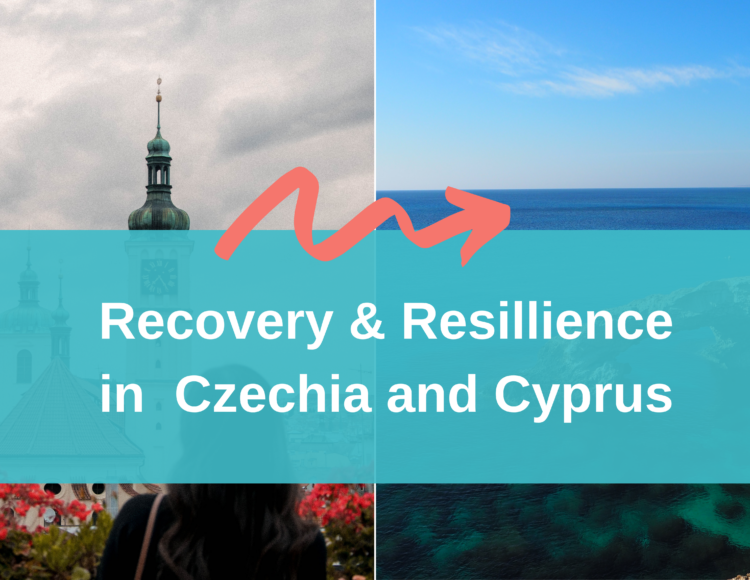As a follow up to our Comparative analysis of last November on the Impact of the Recovery Plans on the social and affordable housing sector, 2 new country profiles are published each month. Now it is the turn of Cyprus and Czechia. Let’s see the highlights of these Plans below.
Cyprus
The total budget of the Cypriot RRP amounts to € 1,206 billion, to be financed through grants of €1,006 billion (at current prices) and additional funding of €200 million in the form of loan.
The Plan consists of five Policy Areas of which the following two are relevant:
- “Accelerated Transition to a Green Economy” (€447,6 million which is 36,3 % of the whole budget),
- “Strengthening the Resilience and Competitiveness of the Economy”.
Affordable housing-specific parts include
- Reform 3: Digital One-Stop Shops to streamline RES projects permitting and to facilitate Energy Renovation in Buildings
- will provide to building owners and investors financial guidance. Integrated part of it will be information about the available funding instruments (including instruments from Cohesion Fund) for each building according to its specific features i.e. building type, building ownership status.
- Reform 4: Energy Storage Regulatory Framework
- Investment 1: Promoting energy efficiency investments in SMEs, municipalities, communities and the wider public sector
- Investment 2: Promoting renewables and individual energy efficiency measures in dwellings and tackling energy poverty in households of disabled people
- Investment 3: Encouraging the use of renewables and energy savings by local/wider public authorities as well as NGOs and facilitate the transition of local communities towards climate mitigation & adaptation
- Investment 5: Energy efficiency upgrading of government buildings.
Enhancing circular solutions
The sub-component 3.1.4 Circular Economy aims to enhance the Cypriot circular economy model through the implementation of a concrete Action plan which will include a grant scheme to enhance investment in the circular economy, open to SMEs aiming to move into a circular operating model. Grants may go up to € 317 500 for each beneficiary, covering up to 60% of the investment cost.
Czechia
the Czech Republic is set to receive € 7.03 billion in grants from the Recovery and Resilience Facility. In addition, it can access loans worth € 15.5 billion (2018 prices) on a voluntary basis.
Out of the six main areas of the Plan, Area number 2 contains relevant investments for the sector: Physical infrastructure & green transition (energy consumption, building renovation, investment incentives).
In total, €1.219 billion is provided for buildings and the RRP focuses on public buildings. For information, private buildings are rather covered by different programmes.
The two components that are the most relevant for affordable housing are the following:
COMPONENT 2.5: BUILDING RENOVATION & AIR PROTECTION (€ 632 million)
The component aims at reducing energy and water consumption in residential buildings, improving quality of living in these buildings, reducing emissions of greenhouse gases and other pollutants.
- Reform 1: Renovation wave in the household sector (by 2025)- €332 million
The measure will support the implementation of energy efficiency improvements in residential buildings and raise awareness of the possibilities to reduce energy needs. Foreseen actions[1]:
- The New Green Savings 2030 programme;
- A two-stage pre-project preparation for households: a basic assessment of renovation options;
- Energy consultation centres of the National Network of Local Action Groups will be set up;
- Training and retraining of workers deploying green construction, green technologies or materials under the State programme for supporting energy savings (EFEKT);
- Reform 2: Support for energy communities (by 2025)-€ 283 million
- Investment 1: Support for the renovation & revitalisation of buildings in the housing sector:
This measure aims at saving energy in residential buildings, constructing new residential buildings that exceed mandatory energy standards, replacing non-compliant combustion sources in households using solid fuels with gas condensing boilers of energy class A, using renewable energy sources.
- Investment 2: Support exchanges of non-compliant heat generators and installing renewable energy sources (by 2025)- € 283 million
By this investment, Czechia is replacing non-compliant combustion sources in households using solid fuels with low-emission heating sources (heat pumps, biomass boilers), and installing renewable energy sources suitable for the housing sector, in particular photovoltaic and photothermal systems.[2]
COMPONENT 2.3: TRANSITION TO CLEANER ENERGY SOURCES (€ 262 million)
- Reform 1: Preparation of an assessment of decarbonisation of district heating (by 2022)
This measure will increase energy efficiency, switching from coal combustion to renewable energy sources, the combustion of natural gas, biomass and waste, and decreasing greenhouse gas emissions and pollutants.
- Investment 1: Increasing installed capacity of sources of photovoltaic energy (by 2026)
New capacity of sources of photovoltaic energy of 270 MWp will be installed and put into operation. Projects will include the construction of photovoltaic power plants on the roofs of companies’ buildings including shelters as well as accumulation of energy aiming at optimizing the generation of electricity.
- Investment 2: Achieving primary energy savings resulting from the modernization of heat distribution
This measure aims at reducing coal combustion for heat production (and related electricity generation) by 2030, in particular by making the district heating highly efficient and decreasing greenhouse gas emissions and pollutants through the replacement of steam-based distribution networks by hot water distribution networks.[3]
Please download the detailed country profiles for more details.
Contact Edit Lakatos if you would like to know more.
[1] Page 70, Annex to the Proposal of the European Commission to the Council https://ec.europa.eu/info/sites/default/files/com-2021-431_annexe_en.pdf
[2] Page 71, Annex to the Proposal of the European Commission to the Council https://ec.europa.eu/info/sites/default/files/com-2021-431_annexe_en.pdf
[3] Page 62, Annex to the Proposal of the European Commission to the Council https://ec.europa.eu/info/sites/default/files/com-2021-431_annexe_en.pdf
